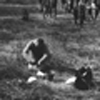 If anything is certain in the work of Rolf Julius, it's the music'spower to draw you in. This is not to say that the German sound artist'sapproach is guided by traditional associations of "intimacy" in music;his creations are too modest and open-ended for such classification.Julius' simple performance and installation pieces inflate and infusethe most basic relationships, between sound and its visual or spatialcorrespondents, with the markings of deep significance within the humanepistemological process. His works succeed by forcing us to recognizeour limits; they are self-awareness exercises, incredibly activeexperiences that give the illusion of supreme passivity. Over threedecades the artist has nudged Cage's "small sound" aesthetic away fromits delicate or ephemeral meanings towards a category of concentratedor elemental qualities, culminating with the definitive Small Musicseries. His early works present some of the more crude examples of thisdirection, less effective of course in their audio-only presentation,but well in tune with the spirit that would produce his more maturepieces. Julius' early sound components remain largely homogenousthroughout these eight works, dominated by a shrill, thereminic tonegenerator, sparse piano, and the occasional flute or plunked drum. Iget the feeling the artist invested much more time in theconceptualizing and constructing of his performance spaces than on themusic itself, which progresses on a near-improvised tack with only oneor two steady sounds in alternately tense and lazy oscillation.Imagined in their original environments, though, these pieces begin tocome alive in fascinating ways. Julius' own notes, included here,provide innocent and perfect introductions: "A number of loudspeakersplay the music for the frozen lake/I hope that the lake itself turnsinto music." (from "Concert for a Frozen Lake"). Pieces like "Music forthe Earth" and "Music for the Eyes" involve similarly straightforwardbut evocative constructions: "an old gravel path through which plantswere sprouting once more" is dotted with ten speakers, and "two smallloudspeakers with the music like spectacles on our open or closedeyes." It's easy to miss the profundity in the artist's words, but thenaïveté that claims images like a lake turning to music or the idea ofmusic itself becoming a looking-glass into the world, communicates alsothe great potential for revelation in such simple works. Julius' titles("Music for..", "Concert for..") reveal, in a humble and indirect way,the level of engagement demanded by each work. Given the artist'smethod for arranging his small sounds with an attempt to hide or fusethem with(in) a particular space, his titles could easily read "Music of..";however, the "for" guarantees recognition of the music's imposition,its artifice. Rather than dismantling the magic of the installation,such a realization becomes essential to Julius' message: that sound hasthe power to absolutely transform space, to reproduce it anew, as muchinside the head as outside. As we search the rocky ground, the lake'sedge, or the corners of a Berlin square, straining to uncover eachminiature source, we are as much drawn in and made aware of theenvironment as it is drawn out into us, filled in with every imaginedpossibility, itself invested with the drama of hearing, truly "musicfor the eyes."
If anything is certain in the work of Rolf Julius, it's the music'spower to draw you in. This is not to say that the German sound artist'sapproach is guided by traditional associations of "intimacy" in music;his creations are too modest and open-ended for such classification.Julius' simple performance and installation pieces inflate and infusethe most basic relationships, between sound and its visual or spatialcorrespondents, with the markings of deep significance within the humanepistemological process. His works succeed by forcing us to recognizeour limits; they are self-awareness exercises, incredibly activeexperiences that give the illusion of supreme passivity. Over threedecades the artist has nudged Cage's "small sound" aesthetic away fromits delicate or ephemeral meanings towards a category of concentratedor elemental qualities, culminating with the definitive Small Musicseries. His early works present some of the more crude examples of thisdirection, less effective of course in their audio-only presentation,but well in tune with the spirit that would produce his more maturepieces. Julius' early sound components remain largely homogenousthroughout these eight works, dominated by a shrill, thereminic tonegenerator, sparse piano, and the occasional flute or plunked drum. Iget the feeling the artist invested much more time in theconceptualizing and constructing of his performance spaces than on themusic itself, which progresses on a near-improvised tack with only oneor two steady sounds in alternately tense and lazy oscillation.Imagined in their original environments, though, these pieces begin tocome alive in fascinating ways. Julius' own notes, included here,provide innocent and perfect introductions: "A number of loudspeakersplay the music for the frozen lake/I hope that the lake itself turnsinto music." (from "Concert for a Frozen Lake"). Pieces like "Music forthe Earth" and "Music for the Eyes" involve similarly straightforwardbut evocative constructions: "an old gravel path through which plantswere sprouting once more" is dotted with ten speakers, and "two smallloudspeakers with the music like spectacles on our open or closedeyes." It's easy to miss the profundity in the artist's words, but thenaïveté that claims images like a lake turning to music or the idea ofmusic itself becoming a looking-glass into the world, communicates alsothe great potential for revelation in such simple works. Julius' titles("Music for..", "Concert for..") reveal, in a humble and indirect way,the level of engagement demanded by each work. Given the artist'smethod for arranging his small sounds with an attempt to hide or fusethem with(in) a particular space, his titles could easily read "Music of..";however, the "for" guarantees recognition of the music's imposition,its artifice. Rather than dismantling the magic of the installation,such a realization becomes essential to Julius' message: that sound hasthe power to absolutely transform space, to reproduce it anew, as muchinside the head as outside. As we search the rocky ground, the lake'sedge, or the corners of a Berlin square, straining to uncover eachminiature source, we are as much drawn in and made aware of theenvironment as it is drawn out into us, filled in with every imaginedpossibility, itself invested with the drama of hearing, truly "musicfor the eyes."Read More

